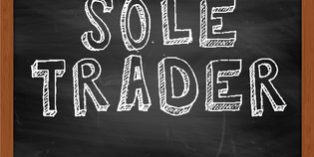Forms Of Ownership- Sole Trader 23-06

FORMS OF OWNERSHIP
Also read the chapter on forms of ownership on the study guide on the D6, pages 88-98
Sole Trader / sole proprietorship
Sole trader or sole proprietor is a business is owned and controlled by one person who takes all the decisions, responsibility and profits from the business they run.
Characteristics of Sole trader
1. The business is owned by a single individual.
2. Being small in size, it is managed by the owner himself. However, he may have some paid workers to assist him, but the ultimate control rests in his hands.
3. The necessary capital to run the business is provided by the sole owner. However, he may borrow from other sources such as friends or bank as need arises.
4. The sole trader is personally liable for the debts of the business. He bears all the risks and nobody else has any stake in the business. The creditor can lay claim not only on his business assets but also his personal property (no legal personality) such as car, houses, furniture etc. to recover the loan.
5. The sole trader tries to keep good relationship with his customers. The customers are generally personally known to the proprietor and their orders are higher valued.
6. The sole trader can set up or close the lawful business as and when he likes because the operation of his business is not governed by any special act or ordinance.
7. The sole trading business is as easy to end or dissolve as is its formation. The decision of the proprietor alone ends the business.
8. There is no specific suffix to be reflected in the name of the sole trader.
9. Sole traders are not compelled by law to prepare and audit financial statements.
Advantages of a Sole Trader
1. There are no restrictions on the capital employed in the business.
2. The owner has full control over the business for daily operations as well as how large they wish to grow it.
3. There are no legal requirements for the creation or running of the business.
4. The owner takes all of the profits made by the business and are entitled the ownership of assets.
5. All financial information is kept private.
6. Decision making is also quick as it's just the owner who decides where the business is heading.
7. it’s relatively straightforward to wind up. The termination of a sole proprietorship is far simpler than in other cases.
8. A sole trader can close contracts and trade in his own name.
9. Information in a sole trade business is available to the owner.
Disadvantages of a Sole Trader
1. A sole trader does not have a legal personality. The owner is solely liable for all the debts of the
business, i.e. any consequences of business failure or any other liability.
2. The liabilities of a sole trader are unlimited. Personal property may be vulnerable for debts and other business liabilities, i.e. the owner’s personal assets can be attached for debt.
3. Large sums of capital are less likely to be available to a sole trader, and you may have to rely more on overdrafts and personal savings. Raising funds is difficult as the business is owned and managed by one.
4. It may also be quite difficult to get larger jobs not only because large corporations have many staff that can work on tenders and offers but because most organisations won't work with a business that only has a staff of one.
5. A sole trader lacks of continuity (shuts down) especially in the event of death or illness. Special provision can be made via the “will” though.